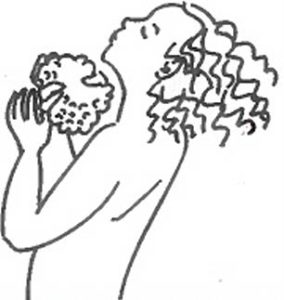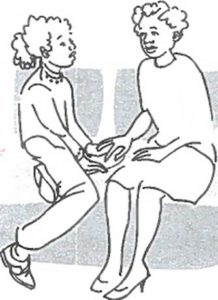Family
Postpartum depression or baby blues- It’s normal for you to feel sad, irritable, tearful, overwhelmed, and to have trouble sleeping after having a baby. This usually gets better after a couple of weeks. Talk to your provider about your feelings if you need help with them.
Development
Crying is common in newborns. Your baby may be hungry, have a dirty diaper, or have colic. He may be cold, hot, uncomfortable, afraid, tired, or in pain. It is important to try and help your baby with these feelings. Often they just want to be held. You can calm your baby by stroking his head gently, talking to him, swaddling, or gentle rocking. Sucking on hands or fingers does not necessarily mean your baby is hungry. This is one way that babies can soothe themselves. It’s normal for your baby’s stomach to growl or for her to grunt or tum red when pooping.
It’s normal for your baby’s poop to be yellow. seedy, brown, or green. It’s also normal for your baby to have hiccups or to sneeze.
Health
When to get medical care – Go to the ER immediately if your baby has a temperature that is more than 100.4 Always take your baby’s temperature rectally (in her bottom). Do not give your baby Tylenol before 2 months of age, or Motrin before 6 months of age. You should also get medical care if you notice your baby has any trouble breathing. If you notice changes in your baby like eating less or peeing less, or have any other concern, you should also get medical care. (Newborns have between 6-8 wet diapers a day.) Don’t give your baby pacifiers filled with honey. This kind of pacifier can leak and cause serious illness.
Nutrition
Breastfeeding – Newborns should feed every 2-3 hours. Having trouble with breastfeeding? You can make an appointment with our lactation (breast feeding) counselor at 512-684-1744 or at Mom’s Place 512-719-3010. Mom’s Place can get a free breast pump for you. If you choose to formula feed your baby, always make it with 1 scoop of formula to 2 ounces of water. But, breastfeeding is best for your baby.
Safety
Car seat safety- For newborns, the car seat should always be placed facing the rear, in the back seat. www.seatcheck.org has great information and videos on how to install and to put your baby in a car seat the right way.
Sleep- Your newborn baby may sleep 14-16 hours a day for 3 hours at a time. Always put your baby to sleep on his back. This can help prevent SIDS (Sudden Infant Death Syndrome) or “crib death.” Smoking also increases the risk of SIDS. Also make sure your baby does not have any pillows, blankets or toys in his crib while sleeping. Always put your baby to sleep in the crib, not in the bed with you.
After Hours and Weekends
After 4:00 PM and before 8:00 AM
For medical advice when People’s is closed call After Hours Nurse line at 512-478-4939
Download PDF here.


